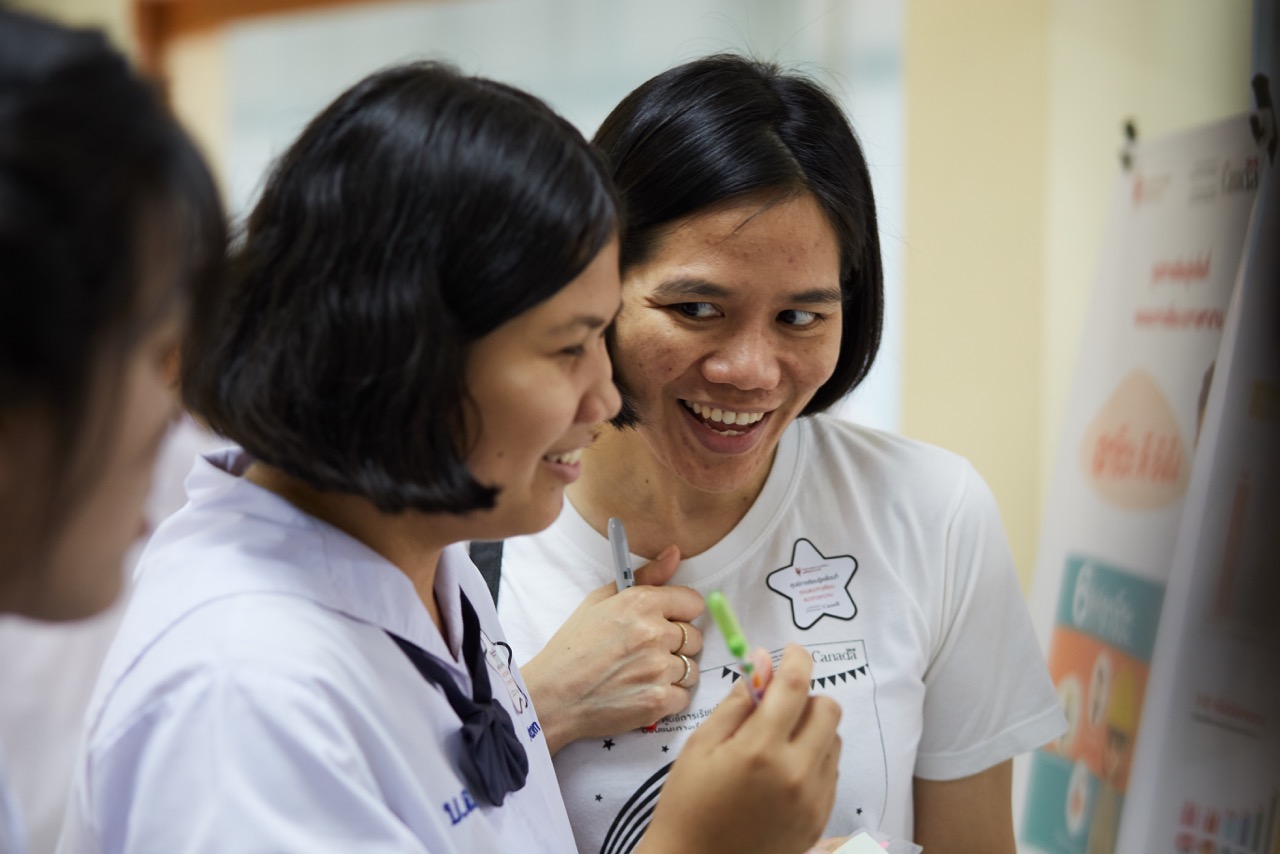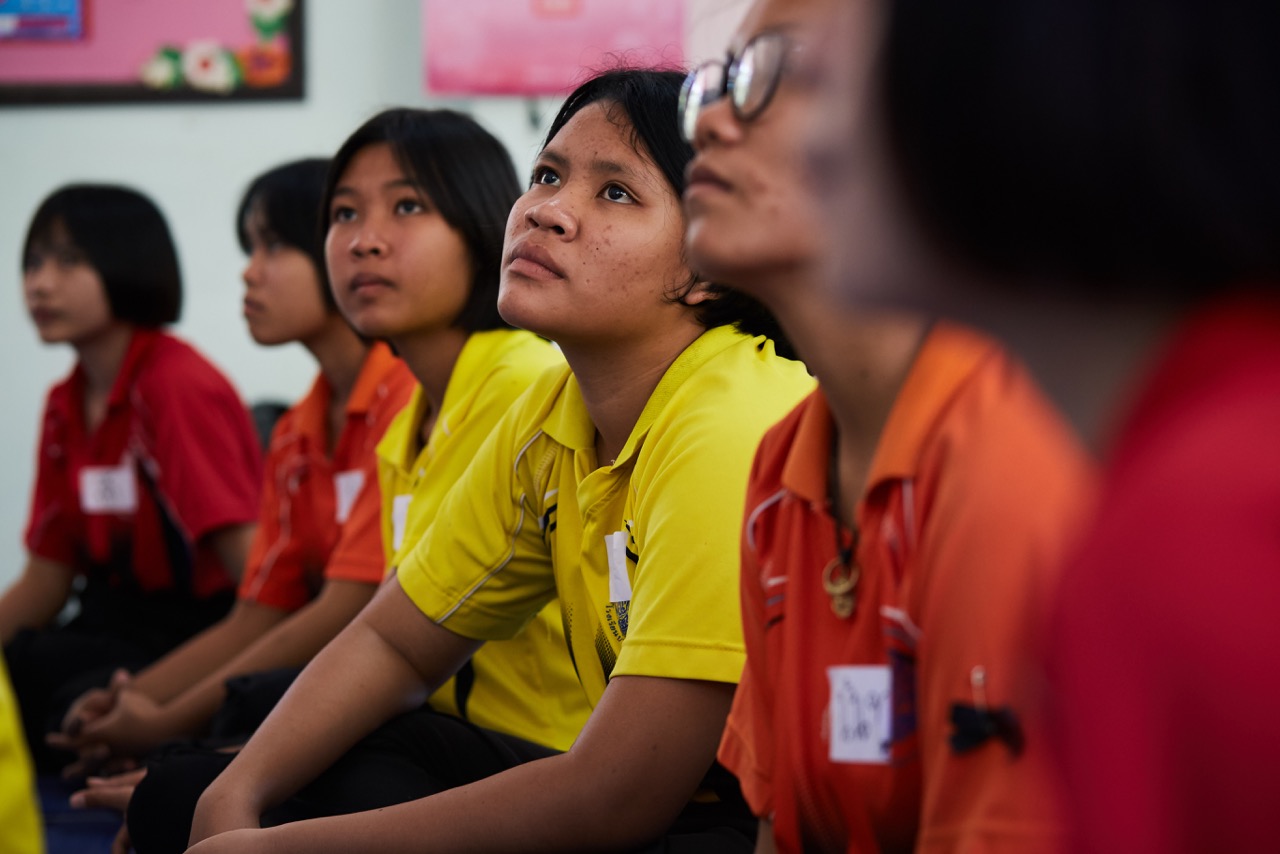UBON RATCHATHANI PROVINCE, Thailand – Baan Khan Rai School sits at the edge of a small village surrounded by rice paddies. In a second-story classroom, a dog pokes his head through the doorway as the morning sun streams through tin shutters. Down below, the Mun River quietly snakes past.
“Show me, how do you imagine your future? What do you see in your mind? What feelings do you have? Now draw it!” says Sarochinee Unyawachsumrith, known as Beer, the managing director of the Pratthanadee Foundation and its Better Me workshops, an empowerment and career-building program for disadvantaged girls in Thailand’s rural northeast Ubon Ratchathani province.
Sitting on a brightly tiled floor, small groups of teenage girls feverishly draw with pencil and crayons. While some churn out pictures of nurses, policewomen, rainbows and flowers, one student, Fai, 15, draws a piggy bank surrounded by floating gold coins.
“My dream is to save as much money as possible so I can support my family,” says Fai. But for now, she admits, she has no idea how.
“We see students like this every day,” says Beer later. “They come from poor backgrounds and money is important, they need it to survive. But we are here to tell them about the risks if they choose the wrong job, what options they have and, perhaps for the first time, to see their own potential.”
In this region of Thailand, commonly referred to as Isaan, Fai’s story is not uncommon. Close to the borders of both Cambodia and Laos, it’s an area as famous for its low education levels, limited employment and grinding intergenerational poverty as it is for its spicy food and farming culture. Ask any number of housekeepers, maids, taxi drivers, factory workers and even sex workers in the country’s capital Bangkok where they come from and, more often than not, the answer will be “Isaan.”
Fai lives alone with her 9-year-old sister while their parents are employed as contract construction workers in a nearby province. Her best friend Nan, 14, and Nan’s younger sister are cared for by their grandmother, while their mother is employed as a waitress in Bangkok and their father works on construction sites just south of the capital.
And it’s precisely students like Fai and Nan that the Better Me program wants to reach.
Running for three weeks at a time, twice a year, in dozens of schools, the program currently reaches 3,000 girls a year. The initiative sprang from the work the Pratthanadee Foundation was doing with adult women back in Bangkok, women who face limited job opportunities due to their backgrounds and education, who are at risk of exploitation and who often, as a consequence, suffer from low self-esteem and self-worth.

“We found through our work in the city that many of the women coming to seek out our services were from the Isaan region, so we decided to set up a regional office and target teenage girls before they make this move,” says Beer. “It’s a preventative approach. We want to give them knowledge on how to make the right choices, help them understand the risks and know where to go for help if they need it.”
Working alongside Beer at the workshops are Ploy, the program’s coordinator, and Nang, 36, a former student of Pratthanadee’s Bangkok workshops and now the Isaan regional branch manager. She came to the foundation while working as a “bar girl” in one of the capital’s infamous red light areas.
“I knew a lot of women from my village who would go and work in the bars in Bangkok,” she says. “The feeling was that if you have children and your family is very poor, you have to do it. Then maybe, if you are lucky, you can find a farang (foreign) boyfriend to support you.”
Though Nang did find the work financially lucrative, she also says it was quite often “dangerous,” and the risks, for her, were simply too high.
“Enrique (Pratthanadee’s founder) asked me what my dream job was, and I told him I wanted to work in an office. I wanted to use a computer and wear a beautiful dress and not to be scared. So he helped me,” she says.
At the heart of the Better Me program is a holistic approach, one that doesn’t judge the girls’ choices or sugarcoat the harsh realities of their situations and the pressure they are often under to help support their families from a very young age.
“Of course, I would like them to stay in school and to get a good job,” says Nang. “But if they choose to, say, work in a factory, we tell them about the labor laws and their rights. I say, ‘If you like this work, then do it. But maybe, in the future, you can go to the next level. Why not see how far you can go?’”

Better Me student Fai says the workshops have opened her mind to new possibilities, as well as the need to think of her future as a journey rather than just looking for that quick fix. In her written feedback at the end of that day’s workshop, she says she would ideally like to continue studying, with a focus on computer science. Though Fai has concerns about how she might afford the fees, she says it’s a goal to work toward, and one that might not only make her the money she craves but also help her find a better life overall for herself and her family.
This kind of visualization and goal-setting is an approach that Beer and her team had never seen before they started using it for their program, and it’s one they believe empowers the girls to think about their lives in a new way.
“When we work with the girls, we listen, we say, ‘OK, this is your dream, let’s work out what you can do now,’” says Beer. “And we ask them to keep the picture they drew of themselves and how they imagined their future life and take it out on this exact date in one year’s time. And we say, ‘Then ask yourself, how am I doing, am I getting closer, am I on track to this?’ We find this gets them to think for themselves. And we are always there if they need.”
